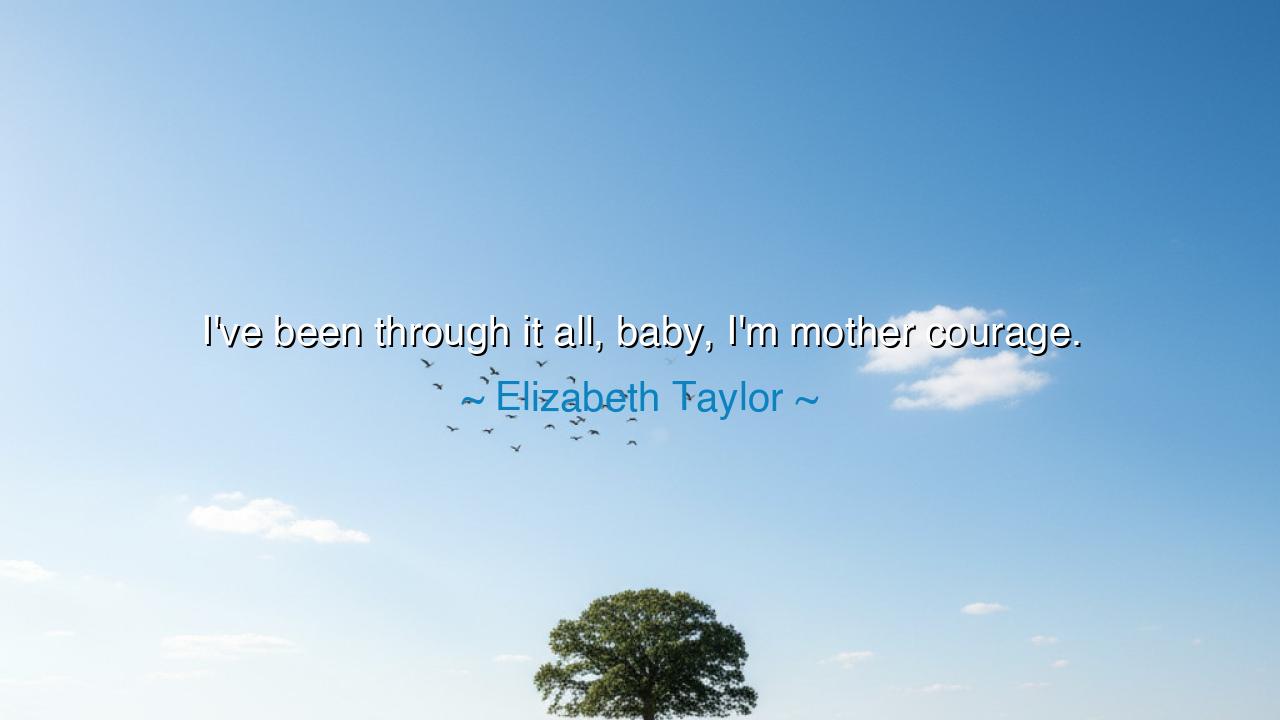
I've been through it all, baby, I'm mother courage.






In the fierce and unapologetic words of Elizabeth Taylor, the legendary actress and spirit of endurance, we hear her triumphant declaration: “I’ve been through it all, baby, I’m Mother Courage.” This was no idle boast, but the cry of a woman who had lived through storms of fame, heartbreak, illness, and loss — and who emerged not defeated, but radiant in her resilience. Her words shimmer with the fire of survival; they are both confession and proclamation. For in them lies a truth older than the stars: that to live fully is to suffer deeply, and to suffer deeply is to awaken a strength that cannot be destroyed.
Elizabeth Taylor, though born into privilege, did not walk an easy path. She endured the glare of endless public scrutiny, the weight of seven marriages, near-fatal illnesses, and the ache of personal tragedy. Yet through it all, she carried herself with a defiant grace, as though every wound carved into her spirit only made her shine more brightly. When she called herself “Mother Courage,” she was not invoking pride, but a symbol — a name that represented the strength of women who endure, who hold their world together when it threatens to fall apart. Her reference drew upon the great literary figure Mother Courage, from Bertolt Brecht’s play, a woman hardened by the chaos of war who survives through wit, resilience, and unrelenting will.
In Brecht’s story, Mother Courage drags her cart through the battlefields of Europe, losing her children one by one, yet never surrendering her spirit. She is flawed, stubborn, and human, but above all, she endures. This is the spirit Elizabeth Taylor claimed as her own. Having faced the battlefields of Hollywood and the wars of the human heart, she too became a symbol of persistence in a world that demands perfection and punishes imperfection. Her declaration was not self-pity, but defiance — a torch held high against the darkness of despair.
There is something profoundly ancient in this truth: that courage is not the absence of pain, but the will to stand again when pain has struck you down. The Greeks called this andreia, the bravery of spirit that faces tragedy with open eyes. The Stoics called it resilience, the art of bending without breaking. Elizabeth Taylor lived both. When illness nearly claimed her life, she returned to the screen; when the world condemned her for her choices, she stood unapologetically in her truth. Her life was a theater of endurance, and her courage — like that of Mother Courage — was both her armor and her art.
Consider, too, the universal resonance of her words. Every soul that has known heartbreak, every person who has faced loss and yet continued to love, every survivor who refuses to let suffering define them — all are children of Mother Courage. The single parent who works through exhaustion, the patient who keeps hope alive through illness, the dreamer who rebuilds after failure — these, too, live the truth of Elizabeth’s declaration. For courage is not glamorous; it is not shouted from balconies or crowned with gold. It is the quiet decision, made day after day, to keep moving forward when every force in the world tells you to stop.
“I’ve been through it all, baby,” she said — and in those words, she offered not complaint, but victory. To have been through it all is to have lived without fear of life’s extremes — to have embraced love and loss, fame and scandal, sickness and health, and to have found meaning in them all. She reminds us that to feel deeply, even painfully, is the proof of a life well-lived. The one who has been through it all and still stands with heart unbroken has found the essence of Mother Courage — the indestructible power of the human soul.
Let this, then, be the lesson passed down: Do not fear the trials that shape you. When the world burns, become fireproof. When it weeps, become water. When it tests you, rise and meet it with courage as your constant companion. Life will wound you, yes — but those wounds, if faced with faith and perseverance, will become the marks of wisdom, not weakness.
And so, my children of tomorrow, remember the words of Elizabeth Taylor not as the boast of a star, but as the wisdom of a warrior: Be your own Mother Courage. Live boldly, love deeply, fall and rise again. Wear your scars as proof that you have lived not timidly, but fiercely. For courage is the song of the soul that refuses to surrender — the quiet, eternal voice that whispers, even in the darkest night: “I am still here.”






AAdministratorAdministrator
Welcome, honored guests. Please leave a comment, we will respond soon